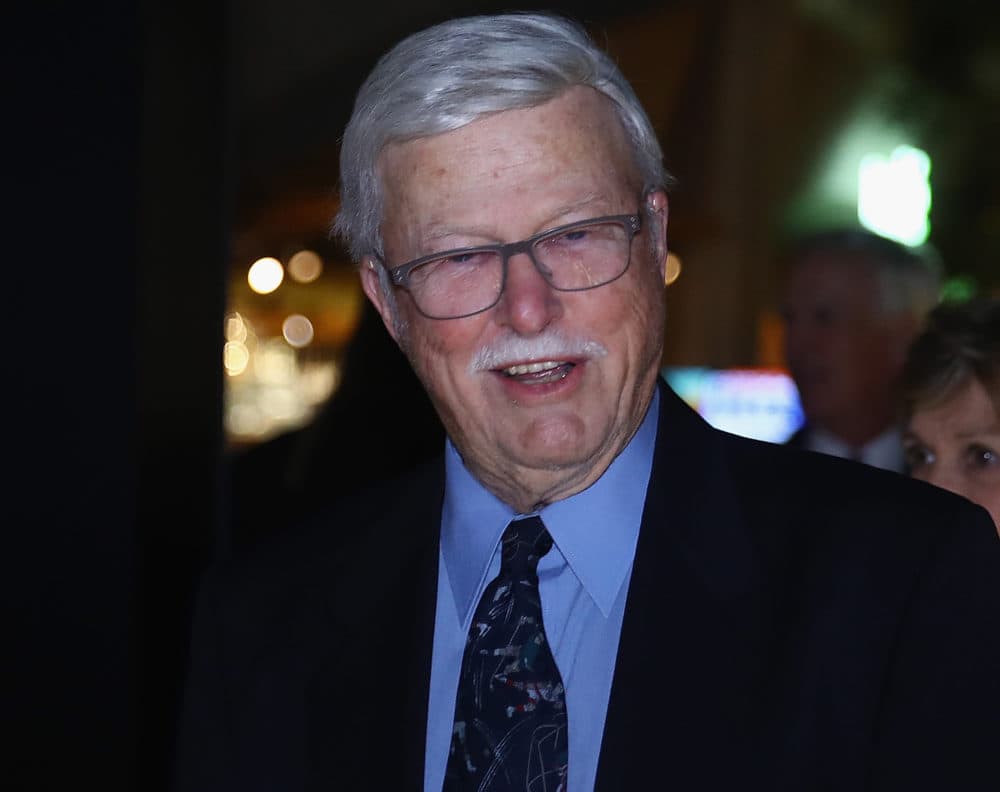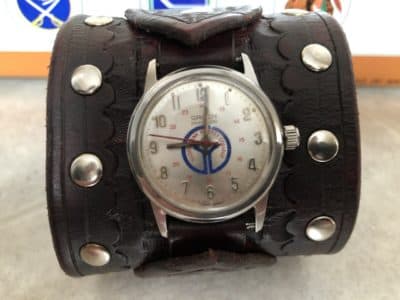Advertisement
Not A 'Bona Fide College': The Story Of The Scotiabank Hockey College

Brian McFarlane is 87 years old. And let’s just say we could do a whole show on all the things he’s done in his life.
"I've served as a host and commentator on Hockey Night in Canada, Canada's No. 1-rated TV show," McFarlane says. "I've been a player in the game, an All-American. I had the great honor of playing 20 years with the NHL old-timers. Inducted into the Hockey Hall of Fame in the media category. And, let's see, I've written about 100 books now — but you'd be more interested in my father, the original author of the Hardy Boys books."
We got in touch with McFarlane to talk about one of his many accomplishments: founding the Scotiabank Hockey College in 1971.
"The Scotiabank Hockey College wasn't a bona fide college — it was just a promotion, really," he says.
The Pitch
"I was working as a broadcaster in Toronto, and I was approached by a major advertising agency."
The agency was looking for a new campaign to pitch to Hockey Night In Canada's main sponsor, Imperial Oil. McFarlane came up with the idea of a promotional giveaway that would also teach kids about the game of hockey — not just the rules and strategies, but fair play and good sportsmanship.
"And they liked the idea," McFarlane says. "So they offered me quite a sum of money to come work for them."
But there was a problem. Imperial Oil already had a very successful ad campaign.
"So they kind of cooled on the idea," McFarlane says. "And that's when I walked about three blocks down the street to the Bank of Nova Scotia. People had told me Scotiabank wouldn't have had any interest in hockey, and I was wasting my time."
But Brian McFarlane is not easily discouraged.
He realized that with a bank as the sponsor, he had the opportunity to teach kids about more than just hockey.
"When I was a kid and I went to the bank for the first time and realized I could put my money in and it would earn interest for me, I was thrilled," McFarlane says. "I thought, ‘That's a great idea.’ "
The Scotiabank Hockey College
Scotiabank agreed to invest $100,000 in the Hockey College promotion. Any kid who opened a Scotiabank savings account would be eligible to pick up a special hockey magazine at the branch office every month.
Advertisement
"I had a centerfold in the magazine of a major NHL hockey star like Guy LaFleur or Darryl Sittler," McFarlane says.
So, the magazine would get kids in the door. And if they made a small deposit, they’d be entered into a lottery to win special prizes.
When Johnny Juke found out about this, he opened a bank account. Just like that.
"Yeah, just like that," Juke says. "Went down with my mom. We signed up."
But he didn't put very much money into his new bank account.
"Oh, God. It was probably about 10 bucks or something like that," Juke says.
Along with his Hockey College News magazine, Johnny Juke took home a little blue book. He used it to keep track of the money in his account.
"You would physically write in there —with a pen — what the account was, how much you put in, how much you took out," Juke says. "All that good stuff."
At Brian McFarlane’s suggestion, Scotiabank hired NHL greats Gordie Howe and Jean Béliveau to host the TV commercials.
"They weren't professional announcers, of course," McFarlane says. "But just the fact that they were there talking about the Hockey College seemed to register."
The Watch
Before long, Scotiabank asked McFarlane to include money-saving tips in his hockey magazine. And he did. He met with bank executives every so often to let them in on his plans. One day, he told the bankers about a young player who’d scored his 1,000th goal at the age of 13.
"I said to the group, ‘We're gonna feature next month in our bulletin Wayne Gretzky, a young phenom from Brantford, Ontario,’ " McFarlane remembers. "One man held up his hand. He said, ‘Well, Brian, we go into Quebec Province — how do you spell “Gretzky” in French?’ Well, that kinda of stumped me. I said, ‘Gentlemen, it's the same spelling French or English.’ "
Brian’s idea was a hit — with the bankers and with the kids.
"The bank branches were quite busy as kids came in to sign up for the Hockey College," Mcfarlane remembers. "Some of them won some dandy trips to Stanley Cup games. And we had bicycles and skates and other prizes."
Johnny Juke was one of those kids. He got a letter in the mail telling him he’d won a watch.

"Come to the bank and pick it up," Juke says. "I was pretty excited because I never won anything, of course. So we went down. It was a big presentation."
Juke got to meet Maple Leafs players — he doesn’t remember who, exactly. But he does remember how good it felt to actually get time to talk with them.
And the next day, Juke wore his new watch to school.
"It made me feel connected to a sport that I really loved," Juke says. "Connected to being Canadian. I grew up Italian. I'm an Italian-Canadian. So it was my connection."
Juke says he doesn’t follow hockey much anymore. But he still has that watch.
"For the longest time, for many years, I couldn't find it," Juke says. "And then it turned up one day, and I thought I'd bring it back to life. And I did. The original strap is long gone, so I made myself a nice leather strap for it."
That watch is actually how we found Johnny Juke — on a watch collector’s website.
"Because of winning the watch, I had a fascination with watches all my life," Juke says.
He says the Hockey College watch was his first, and he still wears it today.
The biggest mark left by the Hockey College might not have been on any hockey fan or player. The biggest mark might have been on the bank itself.
In 2017, Scotiabank bought the naming rights for the Toronto Maple Leafs arena in a deal reportedly worth $800 million.
"From that modest beginning of $100,000 budget to start, they've gone gangbusters over the game now," McFarlane says.
Oh, and in case you’re wondering: the Hockey College still exists ... sort of. It’s now a Hockey Club. There’s no magazine — just a members-only website. And kids no longer need to open a bank account to get access.
This article was originally published on February 08, 2019.
This segment aired on February 9, 2019.



